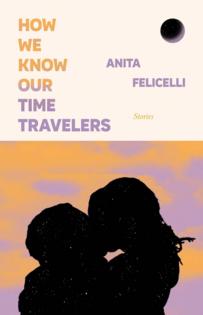Short stories look at those moments when living our lives feels unsettlingly like time traveling
Published in Travel Tips
Anita Felicelli’s stories are masterfully unsettling.
Combine your most eerie déjà vu moment with your most vividly prophetic dream and you have the tone of the 14 futuristic tales in “How We Know Our Time Travelers.” This is the new science fiction. Not so much Isaac Asimov’s techy gadgetry or Ursula K. Le Guin’s moral conundrums, Felicelli’s vignettes explore a world where time and consciousness — the last unexplored frontiers — have been conquered.
The stories are set in the Bay Area in the near future. The government is an unreliable entity, politics have fallen apart and we’ve “rocketed past the point of stopping the death of the planet.” It is a time of drought, wildfires, hurricanes, cult movements, senescent robots, fringe theories and time travel. But, amidst these existential challenges, the need for love and connection remains.
In the first story, “Until the Seas Rise,” a young woman who keeps herself financially afloat by volunteering for pain studies is robbed on the beach on the night of a tsunami. As the wave crests, she reflects on what seems the essential question of the book, “Why can we never control pain? Why are we always controlled by absence? It’s nearly incomprehensible, this ever-present incinerating desire for what’s not there.”
Loss permeates these stories, as do technologies invented to allay it. In “Assembly Line,” an art teacher with a curiously mechanical thought process wonders what her student-turned-boyfriend works on in the “forbidden” rooms of his apartment. In “The Glitch,” rogue holograms assail the coder who created them. In “Keeping Score,” a couple downloads an app only to find that the constant tallying of who does what for whom is destroying their relationship.
And then there are Felicelli’s stories about time. In “Steam Tunnels,” a ragtag group of disaffected female college students is chased by a menacing figure in the sewer system beneath the University of California, Berkeley. When they emerge, the campus has become a ghost town, their clothes are tattered and worn and their hair has turned white. In “The Encroachment of Waking Life,” a woman mistakenly boards a time-travel flight from Barcelona to San Francisco and visits not her boyfriend of the moment but her boyfriend of 20 years in the future.
Women narrate most of the stories, which seems particularly poignant in a world where tech bros dominate the microphones. In one tale, a female potter throws all her clay into the creation of a real boy. In another, a friendless scammer and swindler of wealthy men wonders if a band of anarchic, menacing “fog catchers” exists only in her mind. In another, an elderly mother with dementia struggles to maintain dignity in a world that has discarded her.
I thoroughly enjoyed the mind-bending perspective of these stories, especially the final pair: one a personification of illness that will blow your mind and make you weep, and one an epistolary tale with letters between a scientist consumed by creative mania and her loyal, half-believing friend. Author of novel “Chimerica” and short story collection “Love Songs for a Lost Continent,” Felicelli is a writer to watch.
____
How We Know Our Time Travelers
By: Anita Felicelli.
Publisher:WTAW Press, 196 pages, $18.95.
©2024 The Minnesota Star Tribune. Visit at startribune.com. Distributed by Tribune Content Agency, LLC.











Comments